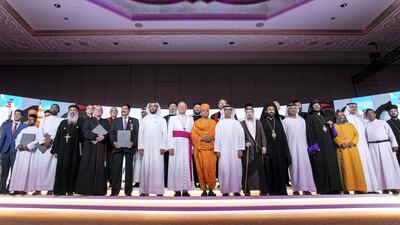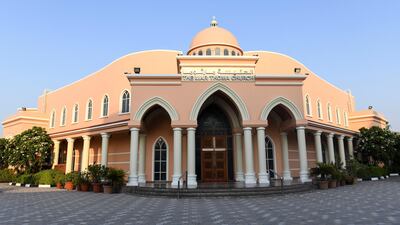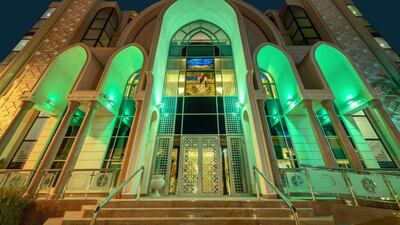Senior Anglicans in the UAE on Sunday said they welcomed "a new beginning" for the Christian community in the country after more than a dozen non-Muslim places of worship received official legal status.
Abu Dhabi's oldest church, together with the UAE's first Hindu temple, were among 18 places of worship registered by authorities for the first time.
Many of the churches have existed in the Emirates for decades, with some having been given the land they are built on by Sheikh Zayed, the nation's Founding Father.
Now, however, after an award ceremony, the sites will have official legal protection under a Department of Community Development initiative.
“Today marks the coming of age between the church and the United Arab Emirates,” said Rev Canon Andrew Thompson, senior Anglican Chaplain of St Andrew’s Church – one of the churches to receive a licence.
“The sheikhs has been generous in giving churches land for the last decade but we have never really had a mechanism to deal with government departments.
“Today marks a new beginning for the Christian community in particular, where we know we have friends who will be responsible for us and will help us with the entire legal framework.”
The new licences, which are decorated with a drawing of Sheikh Zayed Grand Mosque and feature the handwriting of Sheikh Zayed the First, grandfather and namesake of the Founding Father, regulate "everything from permission for special events to land to banking," Rev Thompson said.
“[They will help us in] all sorts of things where we have had nowhere to go before. We existed on an ad hoc basis but those days are over.”
The licensed churches cover Catholic to Coptic, Orthodox to Latter Day Saints and are spread across Abu Dhabi and Al Ain.
“This special effort taken by the UAE government to license and register officially religious places is a remarkable step and reflects the sincerity and integrity of the nation and the leadership,” said Pujya Brahmavihari Swami, head priest of Baps Hindu Mandir – the UAE’s first Hindu temple.
"It is a great signal to the world that the way forward for humanity is global inclusiveness where we not only respect each other's beliefs but also accept their existence. I truly believe this is the beginning of a great era of harmony."
Father Benny Mathew, of St George’s Orthodox Cathedral, said their church was set up in 1968 after Sheikh Zayed granted them land in Al Mushrif. More than 2,000 families now regularly attend.
"By getting these licences everything has been strengthened," he said. "Previously, we used a letter from Sheikh Zayed for all our government dealings but now we have an official licence that will make our dealings easier."
Bishoy Salib of St Anthony's Cathedral Coptic Orthodox Church called the licensing scheme a landmark in UAE history. "Now we are harvesting the fruits cultivated by Sheikh Zayed," he said. "The fruits of tolerance and acceptance. We have always been recognised in heart but now it is also on paper."
The Coptic Church was established in the UAE in 1974. It now has seven churches with an eighth opening soon in Ruwais.
On Sunday, Dr Mugheer Al Khaili, chairman of the Department of Community Development, said the official recognition of the places of worship “underscores the efforts of Abu Dhabi in fostering the principles of fraternity, affinity and harmony among all segments of the community.”
“The late Sheikh Zayed bin Sultan Al Nahyan, founder of the UAE, was keen to establish a cohesive society in which everyone participates to build, develop and upgrade the nation.”
Apart from many mosques, there are more than 40 churches across the UAE, a Sikh gurdwara in Dubai, two small Hindu shrines and a small synagogue also in Dubai.
At the weekend, the UAE revealed plans to build The Abrahamic Family House on Saadiyat Island.
It will have the UAE’s first official synagogue, a mosque and a church – representing the three major Abrahamic faiths.














